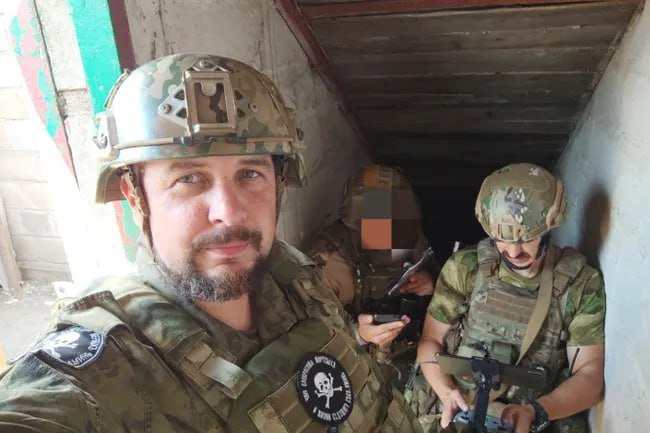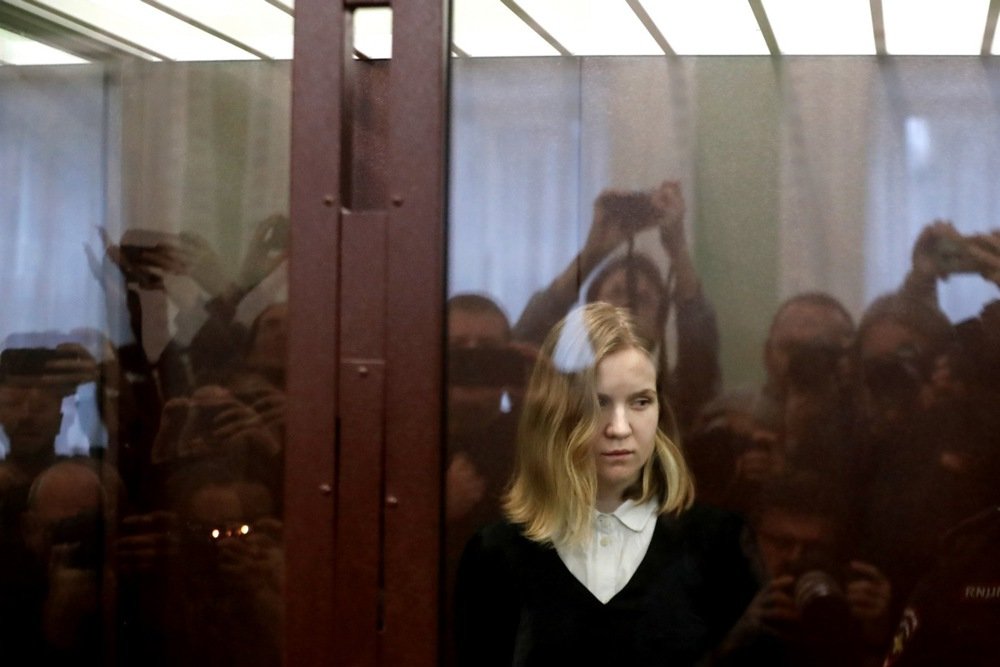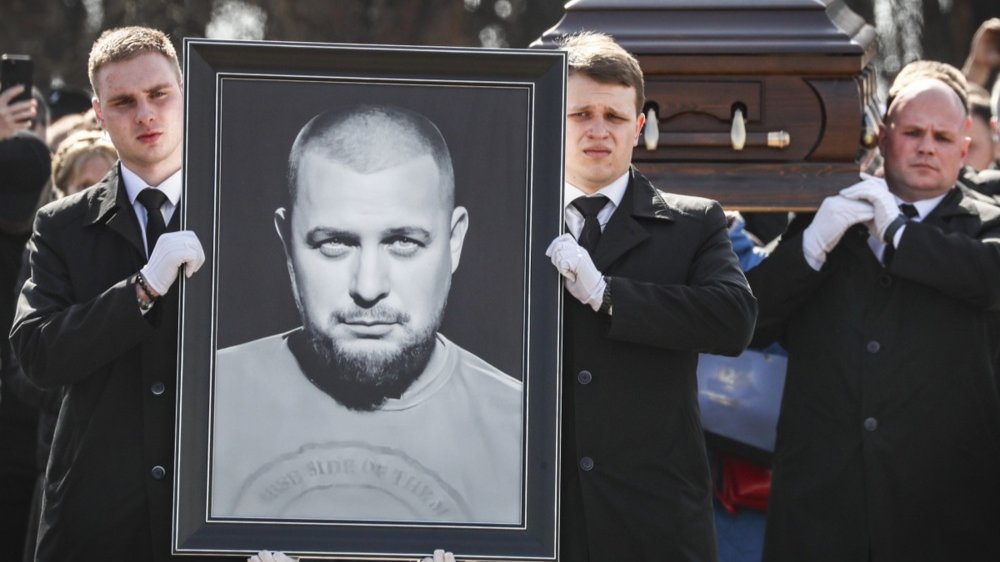A court in St. Petersburg sentenced Darya Trepova to 27 years in jail on Thursday — the longest prison sentence given to a woman in modern Russian history — for her role in the killing of a prominent pro-war blogger.
Trepova’s arrival at a St. Petersburg café on 2 April where notorious pro-war pundit Vladlen Tatarsky was due to speak, marked the culmination of months of externally directed efforts for her to get close to him, according to Trepova, who said that on the night in question she planned to present a gift to Tatarsky containing a listening device.
Footage taken during the event shows Tatarsky awkwardly accepting a somewhat gaudy, gold-coated bust of himself. Sitting just metres away, Trepova can be seen beaming back at him. Shortly afterwards, however, Trepova’s gift exploded, killing Tatarsky and injuring 52 others.
The following day Trepova was arrested and charged with committing a terrorist attack, the illegal trafficking of explosives and forging documents. Russia’s Federal Security Service (FSB) said that the attack had been planned by the Security Service of Ukraine.
Trepova, a pacifist whose anti-war views led to her being arrested for protesting against the Russian invasion of Ukraine on the day it began, is perhaps the last person you’d expect to see in the dock for a political assassination. In interviews with journalists, her friends say that while Trepova held anti-war views, she never expressed sympathy for radical ideology — rather, she was a typical young adult, living in St. Petersburg and working in a vintage clothing shop.

Darya Trepova. Photo: social media
A month after the attack Trepova told journalists that she “deeply regretted what happened and prayed for the recovery of all those injured”. Speaking about the death of Tatarsky, she said that she has always been a pacifist and that the outcome of her actions had made her suicidal.
She once again expressed her remorse during her final testimony in the courtroom on Monday, which she used to ask the victims for their forgiveness:
“I am very sorry that because of me you had to endure pain and horror that I cannot even imagine, even though I was there with you. And I’m sorry that because of me, you face trauma that will remain with you for life.”
Just how a self-professed pacifist came to commit the murder of a man she described as “fairly good natured” and who she claimed to have “no dislike for” was a key issue in her trial. In her testimony, Trepova said that she had been duped into carrying out her actions by Russian opposition journalist Roman Popkov, who is based in Kyiv, and an unnamed individual whom she only knew by his alias, Gestalt.
According to the version of events Trepova told the court on 16 January, she began acting on behalf of Popkov after he promised her the chance to work as a journalist in Ukraine. Over a year and a half the pair remained in contact via social media, and in November 2022 Popkov introduced her to Gestalt.
Popkov and Gestalt both expressed an interest in Vladlen Tatarsky, whose real name was Maxim Fomin, a Ukrainian-born former coal miner and convicted bank robber who rose to fame as a military blogger providing commentary on the war in Ukraine. After escaping prison during the War in Donbas in 2014, Tatarsky fought in the separatist Vostok Battalion before moving to Moscow in 2019, acquiring Russian citizenship two years later.

Photo: Tatarsky’s Telegram channel
After the full-scale invasion of Ukraine, Tatarsky returned to Donbas several times, sharing updates from the frontline to his Telegram channel’s 500,000 followers. Key to establishing himself as one of the more prominent ultranationalist commentators on the war was a now infamous video he shared of himself in the Kremlin on the day Russian President Vladimir Putin announced the annexation of the Donetsk, Kherson, Luhansk and Zaporizhzhia regions of Ukraine. “We’ll beat them all, kill them all, rob them all. It’ll be just the way we like it,” Tatarsky shouted gleefully into the camera.
Using intentionally shocking rhetoric to boost his notoriety, Tatarsky eventually established himself as a far-right star of Russian social media and began to accept speaking engagements in cities across Russia, which was how Trepova first came into contact with him.
During her testimony, Trepova said that she bought Tatarsky’s books and travelled to meet him on multiple occasions using a fake name, on instructions from Popkov and Gestalt. She explained that she understood their interest in Tatarsky to be linked to the Defence Ministry contacts he often boasted about.
According to Trepova, Gestalt instructed her to deliver a small statue to Tatarsky during a seminar he was giving in St. Petersburg on 2 April. Trepova expressed her concerns about what might be inside the statue, but Gestalt assured her it was just a listening device.
In the immediate aftermath of the blast, Trepova said in her testimony, she attempted to check on Tatarsky and help him. Upon realising that he was likely already dead, she called Gestalt and accused him of framing her before quickly leaving the café, “afraid that they’d lynch me then and there”.
Gestalt ordered Trepova a taxi and instructed her to go to the airport right away, but she refused, fearing that she’d be arrested. Instead, she took refuge at the St. Petersburg apartment of Dmitry Kasintsev, an acquaintance of her husband Dmitry Rylov. Kasintsev was initially charged with failure to report a crime, but the charge was later revised to concealment and he was ultimately sentenced to one year and nine months in prison.

Darya Trepova attends a court hearing in St. Petersburg, 15 November 2023. Photo: EPA-EFE/ANATOLY MALTSEV
Ultimately, a lack of evidence clouds any certainty over Trepova’s guilt. During her final statement to the court, she argued that if her conversations with the two men had been preserved, the case that she had been framed would be self-evident. Instead, she argued, the court presented the lack of evidence as evidence itself that a crime was being intentionally concealed.
Trepova’s husband made a public plea to Popkov last week in which he called on him to admit he had framed Trepova.
“I am certain,” he wrote on Twitter, “that you had a hand in masterminding Darya’s self-sacrifice, which she herself was unaware of.”
Popkov responded by admitting that he was indeed acquainted with Trepova, but denying that he had put her into contact with Ukrainian intelligence officers, and challenging The Washington Post’s findings that the attack on Tatarsky was orchestrated by the Security Service of Ukraine. The Russian Ministry for Internal Affairs has put Popkov on the federal wanted list.
Popkov commented on Trepova’s sentencing on his Telegram channel on Thursday, describing the news as one of the hardest blows he’d received in the two years since the war began. “Dasha, like other victims of the Russian Gulag state, must be released,” he wrote.
Join us in rebuilding Novaya Gazeta Europe
The Russian government has banned independent media. We were forced to leave our country in order to keep doing our job, telling our readers about what is going on Russia, Ukraine and Europe.
We will continue fighting against warfare and dictatorship. We believe that freedom of speech is the most efficient antidote against tyranny. Support us financially to help us fight for peace and freedom.
By clicking the Support button, you agree to the processing of your personal data.
To cancel a regular donation, please write to [email protected]

